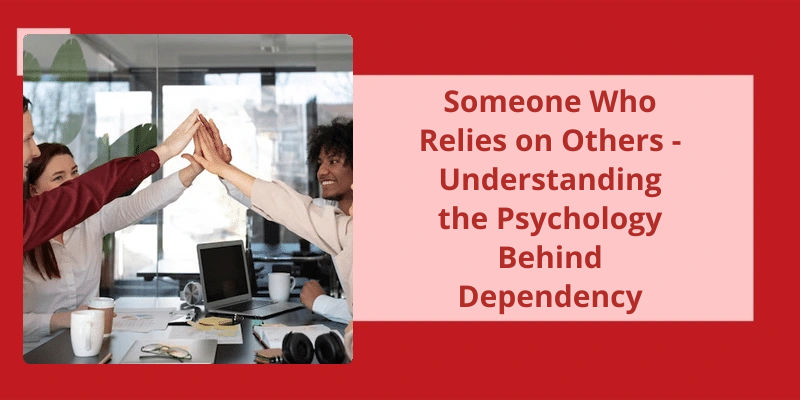As human beings, we all have needs that we can’t always fulfil on our own. Whether it's emotional, physical, or financial support, there are times when we rely on others to help us get by. For some, this dependency becomes a way of life, and they’re labelled as dependents. A dependant is a person who relies on another for support, particularly financial support. It could be an elderly parent who needs assistance with daily living activities, a child who requires constant care and attention, or an individual who’s unable to work due to a disability. The term dependent can also refer to someone who’s emotionally reliant on another person, such as a partner or friend. While some may view being a dependant as a negative thing, it's important to remember that we all need help from time to time, and there's no shame in accepting it.
What Is It Called When You Rely on Someone or Something Else?
Dependency is an essential aspect of human life. As individuals, we rely on different things or people to get through our daily activities. When we talk about being dependent, we refer to the situation where we can’t function without support from external sources. This connotes a state of helplessness, reliance, and vulnerability.
One of the most common forms of dependency is financial. Many people rely on others to provide them with the means to survive. This could be in the form of parents paying for their childrens expenses, spouses supporting each other, or governments providing welfare for their citizens. Financial dependence can be both voluntary and involuntary, and it often comes with various expectations and responsibilities.
Emotional dependency is another common form of dependence. In this case, individuals may need the constant reassurance, attention, or validation of others to feel loved, valued, or significant. Emotional dependency can be problematic as it puts a lot of pressure on the people providing support to maintain the relationships dynamics.
Dependency can also take different forms in physical health. Individuals with disabilities or chronic illnesses often rely on others to perform certain tasks that they can’t do themselves. Caregivers and nursing staff provide support to the sick and elderly, enabling them to carry out daily activities. Physical dependency implies relying on others to carry out essential activities such as bathing, eating, and mobility and can feel very disempowering.
Other forms of dependency include technological dependencies, where we rely on machines or devices to carry out tasks. Media dependency is another form of dependency where people rely on the information from mass media platforms to stay informed or entertained. being dependent primarily means relying on external sources for support. While it’s essential to get help when we need it, it’s also important to strive for autonomy and independence.
When we encounter hardships or face challenges in our lives, there are times when we need to depend on someone to help us get through them. It could be a friend, family member, or a professional, but regardless of who it is, relying on someone is a natural and normal part of life. In this article, we explore the different words and synonyms that can be used to describe relying on someone, and how each of them differs in meaning and context.
What Is the Word When You Rely on Someone?
The concept of reliance is deeply rooted in human nature. Since the beginning of time, people have been relying on one another to fulfill their needs, desires, and aspirations. The English language has many synonyms for the phrase “rely on” that capture the nuanced ways in which people depend on one another. These words reflect the various degrees of trust, confidence, and faith people have in one another.
Some words that capture the sense of trust and confidence include “believe in” and “count on.”. These words suggest a high degree of confidence and trust in another person to perform a task or fulfill an obligation. When we believe in or count on someone, we’re putting our faith in them to deliver on their promise or commitment.
Other words that suggest a deep sense of trust are “depend on” and “rely on.”. These words convey the idea that someone is relying on another person to provide them with something they need, such as support, guidance, or emotional comfort. When we depend on or rely on someone, we’re placing a significant amount of trust in them to be there for us.
The word “bank on” is often used in a more pragmatic sense. It suggests that someone is relying on a particular outcome or event to occur so that they can achieve their goals. When we bank on something, we’re making a calculated risk based on our expectations of what’ll happen.
The word “turn to” is often associated with seeking help or support from another person. When we turn to someone, we’re asking them for assistance or guidance because we trust their judgment and expertise. This word also suggests a relationship of mutual trust and respect.
Whether we believe in, count on, depend on, trust, bank on, or turn to someone, we’re acknowledging our interdependence and the importance of human connection.
The Psychology Behind Trust and Reliance: An Exploration of Human Behavior
This article discusses the factors that influence human behavior when it comes to trust and reliance. It delves into the psychological mechanisms that shape our decisions and reactions to situations that require trust or dependence.
Source: 19 Synonyms & Antonyms for RELY ON – Thesaurus.com
Conclusion
In conclusion, being a dependent or someone who relies on others isn’t something to be ashamed of. It’s a normal part of life, and many individuals find themselves in situations where they require support, especially financial support, from those around them. However, it’s important to note that seeking independence and becoming self-sufficient should always be the ultimate goal for any dependent individual. Dependence should only be a temporary state, and taking proactive steps towards greater self-reliance can lead to a more fulfilling and empowered life. At the same time, offering support to dependents can be an act of kindness and compassion, and can go a long way in making a positive impact on someone's life. Ultimately, whether as a dependent or a supporter, it’s important to remember that we all have a role to play in supporting each other, and that no one should ever feel alone or unsupported in their journey through life.






